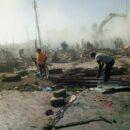Shigeg Karo One Week On
Six days after the aerial attack on Shigeg Karo, UNAMID has finally spoken out, in a press release that raises more questions than it answers. A verification team visited Shigeg Karo on Thursday””a full four days after the bombing, taking nothing to assist the wounded still remaining there””and confirmed the market was “completely burned”. The school, which was beside the market, appears to have been undamaged, contrary to initial reports.
The UNAMID release claims this assessment was “rapid”. It says the village was “reportedly (the italics are mine) subjected to aerial bombardment by the Sudanese Armed Forces”, yet speaks of seeing “four craters as a result of the bombings”. Who bombed the village if SAF did not? The rebels have no planes.
UNAMID also says Shigeg Karo “is a remote and isolated area in a valley surrounded by hills”. Shigeg Karo is a relatively large market town, seat of the most senior tribal leader of the Bideyat tribe in Darfur, and lies on the direct road into Darfur from the major border town of Bahai. If it is “remote”, it is remote only from the humanitarian organizations which have virtually no presence in North Darfur. It is the humanitarians who are remote, more than the village. Alleged remoteness is no excuse for what happened””more correctly: did not happen””last week.
Questions arising from the UNAMID statement:
1. UNAMID says “had the verification team been given access in a timely manner it would have been able to assess the situation better and provide assistance to the injured.” Who impeded access, when, and how?
2. A UNAMID spokesman said earlier in the week, in response to a question, that “on the morning of 6 May (Tuesday), the Sudanese authorities granted clearance to evacuate the wounded from Shegeg Kora (cq). Medical Evacuations are currently being carried out by humanitarian organizations.” Why did UNAMID not move on Tuesday, then? The most badly injured children were not driven out of the village until Tuesday afternoon. Which “humanitarian organizations” evacuated local people? The badly injured children were evacuated in local cars and driven east, half way across Darfur, in search of the ICRC. (We hear that two have since had legs amputated.) The less badly injured made their own way west to Chad.
3. The UNAMID release speaks of eight dead in three graves, “six men and two women”, and quotes the SLA as saying 12 civilians were killed and 27 injured, including 12 seriously. The verification team comprised personnel from UN Department of Safety and Security (UNDSS), Human Rights, Humanitarian Liaison, OCHA, Ceasefire Commission (CFC), Public Information, and UNMIS Civilian Protection. Did none of these people find and speak to the families of the victims, to be able to pronounce with authority on the extent of this atrocity? Any journalist worth his/her salt would have.
4. The release makes no mention of six children locals say were killed. Namely: Fatima Suleiman Adam Omar, 10; Fatima Ahmad Bashir, 8; Mubarak Mohammed Ahmad, 10; Yusuf Adam Hamid, 5; Munira Suleiman Adam, 7; Adam Ahmad Yusuf, 11. What happened to these children? Why does UNAMID not acknowledge that children died? This was more than a “tragic” incident”. It violated the rules of war.
5. The UNAMID release says, “The verification team has also observed four craters as a result of the bombings. One crater was quite large (1.5 by 3m sq). The authenticity of the large crater could not be ascertained.” When is a crater not a crater?
Even before Darfur rebels from the Justice and Equality Movement attacked the capital on Saturday, there were suggestions that the Sudan government was planning a new offensive in North Darfur. If UNAMID’s response to future atrocities””whether by the government or by the rebels””is of the quality we have seen in the last week, it might be better if it packed its bags and left. UNAMID is already losing the trust of the people and episodes like this will only increase the anger and resentment directed against it.
Editor’s note: For more details on the bombing see Darfur Diaries website.





